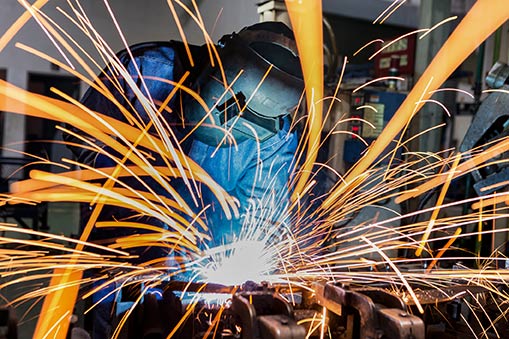.jpeg)
.jpeg)
This course focuses on imparting a comprehensive understanding of ‘stated’ and ‘implied’ requirements (i.e. Content and Intent) of the Welding Qualification code. The candidates would gain insight into ASME Section IX to facilitate interpreting, understanding and complying with the Code rules. The program covers a quick review of common welding processes, their merits and demerits, detailed methodology of Procedure and Performance Qualifications; step by-step explanation for preparation of WPS, PQR and WPQ records. The course covers detailed Road Maps for the review of welding qualifications for different Processes, and extensive case studies for application of the Road Map. Attendees will come away from this course with a clear understanding of the methodology of using Section IX and how code requirements are to be ad-dressed. Emphasis will be placed on writing welding procedures, prepare welding specifications and welder qualifications.
By the end of this course delegates will be able to:
Inspectors, welders, welding supervisors, quality control personnel, technologists, and engineers involved with new welding procedure and welder qualifications for new fabrication, repairs, maintenance, and inspection for pressure vessel or piping. This course is also designed to assist ABSA Welding Examiner, Pressure Equipment Inspector and CSA W178.2 exam candidates
Safety Codes Acts
General Review to ASME IX
ASME Section IX - WPS, PQR, WPQ Reviews
Base Metal Metallurgy of Carbon and Alloy Steels
Welding Metallurgy of Carbon and Alloy Steels
Base Metal and Filler Metal Specifications (ASME Section II Parts A and C)
Developing a WPS/PQR for ASME Sec. VIII-1, B31.1, B31.3
CDGA attendance certificate will be issued to all attendees completing a minimum of 80% of the total course duration.
| Code | Date | Venue | Fees | Register |
|---|---|---|---|---|
| FAC152-02 | 11-05-2026 | Istanbul | USD 5950 | |
| FAC152-03 | 06-09-2026 | Muscat | USD 5450 | |
| FAC152-04 | 14-12-2026 | Kuala-Lumpur | USD 5950 |
.jpg)
This course is designed for the individual that needs to expand the candidates’ core competence on the subject of welding. Designers, inspectors, managers, or welders with a need to understand the fun ...

This training course is designed to give a comprehensive discussion of the subject of Applied Welding Metallurgy with emphasis on practical aspects. The course will concentrate on practical issues whi ...
.jpg)
This is a basic course that will train the candidates to comply with the layout, scope, use and requirements of ASME Section IX, Welding and Brazing Qualifications. Participants will gain a working kn ...
.jpg)
Welding Technology plays a major role in all maintenance and fabrication activities in the industry. Production equipment, a highly sophisticated welding technique and qualified personnel allow proces ...
Providing services with a high quality that are satisfying the requirements
Appling the specifications and legalizations to ensure the quality of service.
Best utilization of resources for continually improving the business activities.
CDGA keen to selects highly technical instructors based on professional field experience
Since CDGA was established, it considered a training partner for world class oil & gas institution
3012, Block 3, 30 Euro Business Park, Little Island, Co. Cork, T45 V220, Ireland
Mon to Fri 09:00 AM to 06:00 PM
Contact Us anytime!
Request Info